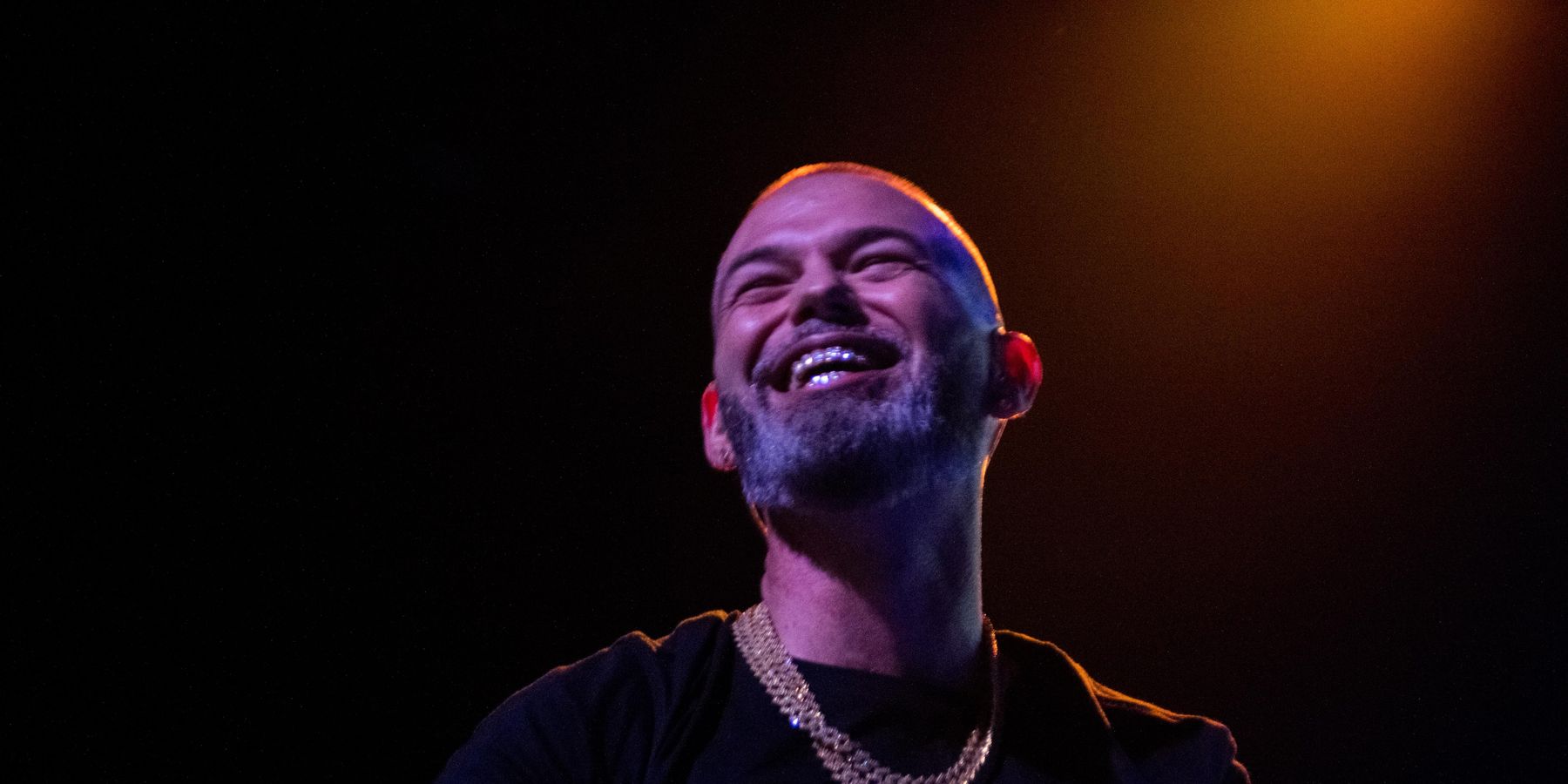
Paul Wall's grill reflects the dim lights of the venue as he flashes me that signature grin he always has. He's a naturally happy person, and he stops our conversation several times to say hi to the venue staffers that give him a wave. When his phone vibrates through his pants and shakes the couch we're sitting on, however, he doesn't react, giving me his full attention as he recounts vivid tales of growing up in Houston.
We're united for his performance "against" Austin-bred guitar maestro Gary Clark Jr. for Red Bull's annual SoundClash. Wall prefers to call it a "sound collaboration," although it doesn't roll off the tongue as well. A longtime student of his rapper peers before he had his turn at mainstream success, Wall just wants to perform and make people smile.
Wall comes from a deep lineage of Southern rap. His signature deep voice and unshakeable drawl are instantly recognizable, much like his peers Bun B, Slim Thug and Lil' Keke, all of whom have made their marks as some of the most interesting voices in the genre. Wall is also a student of the late DJ Screw, ravenously consuming his endless catalog of chopped and screwed remixes of songs as well as the iconic freestyles he'd include — most notably his June 27 freestyle, which is still cited as one of the most impressive feats in hip-hop.
Above all else, Paul Wall is a man of the people. After all, his hit sophomore album is titled The Peoples Champ. He's a walking encyclopedia of his city and he doesn't forget a face or a name. As a beloved member of his community, he's been active in the philanthropic efforts that he and his peers often complete to give back to the streets that made them. Wall has been noted as one of the few acts who have transcended the "white rapper" label. The living legend is just eager to continue breathing new life into the old classics that have helped define a generation, region and sound.
Below, read PAPER's conversation with the Houston legend ahead of his match-up with Gary Clark Jr.
You and Gary are on opposite ends of the spectrum for a lot of people, but you two have more in common than some realize.
It's dope! It's just bringing Texas music together. You know, we both have a lot of the same influences, although we do different styles of music. To me, it's more like "sound collaboration" than "sound clash" because ain't no way I can compete with Gary Clark Jr. He 'bout to blow me out the water. I've been joking with him, like, "Man, you a real musician. I'm gonna be doing karaoke." He's a real musician! So it's just very inspiring because he's somebody that I've seen perform plenty of times. I've known him for a while. To be able to perform with him like this? It's next level. He's the first person that came to mind when they said I could do it, because I was like, "Let me! Let me do it. Can I do it?" "Well, who you want to go against?"
You were the one who chose Gary?
Well, I did it last year. I was The Suffers' host. One of my friends who works for Red Bull, I was telling him, "What I gotta do to be the artist next year?" They pitched it and it got approved. And that's when they were like, "Okay, well, if you go up, Paul Wall, who would you go against?" The first person I thought was Gary Clark Jr. because he's just next level with his performances, his showmanship, his music, all of that. I know that we have a little crossover, actually. If there's a Gary Clark Jr. concert and he brings me out on stage, it's a lot of people there that will be Paul Wall fans, or if it's a Paul Wall concert and I bring him out, there's a lot of Gary fans.
What's it like to have a setlist so full of your old hits when you have a lot of new songs to play? It must be frustrating.
We laugh about that because we'd be like, "Okay, what's the most recent song that we perform?" It's like 10 years old. So it'll be like that. But I mean, those classic hits, we had to go out there and work on them. When we first performed them, it wasn't everybody singing them word for word. Some of them got the same response that we would get if we do a brand new song now. But we went out and worked and worked and worked and worked. Now it's become a classic staple! It's definitely frustrating because you know, we still do music. That's just how it goes and people want to hear what they want to hear.
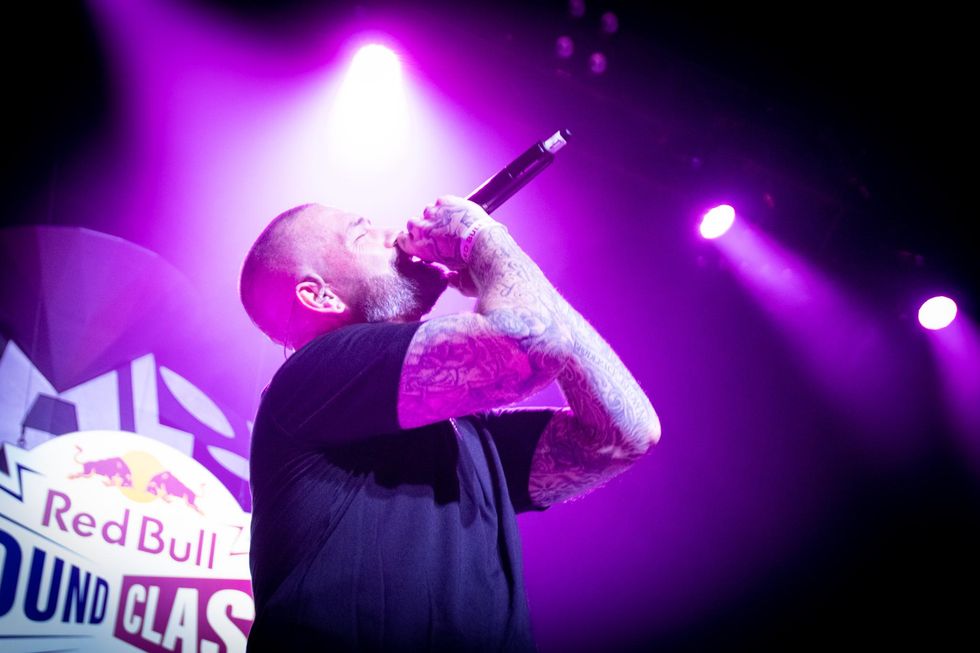
Lance Scott Walker told me that identity is especially tied to place down South, and it's part of why the sounds are so distinct and the scenes are so tight-knit. What does that mean for you?
For us, as hip-hop was birthed and came to the forefront, and just industry and entertainment in general, it was mostly New York or East Coast hip-hop. That's what we would see on TV watching MTV Jams. Anything that was on TV, you'd see East Coast hip-hop. Now growing up here in Houston, when you would listen to the radio, the people that owned the radio stations were based on the West Coast, so it would be programmed to a lot of West Coast music. When we want to hear Southern music, it wasn't a lot of avenues. The Screw tapes were like the main avenue for us to really hear Southern music, and that's a big reason why we took so much pride in jamming Screw because that'd be the only place you could hear Southern rappers.
That's why all these labels like Suave House, No Limit and Rap-A-Lot started as small operations out of houses and stuff, because they weren't going to wait for someone to knock on their door.
Right! Texas and Houston, it's like a land of "do-it-yourself." You can do it but you got to do it. No one's gonna do it for you, you got to put in the work. So that's what J. Prince showed us, and Tony Draper was doing Suave House. For sure, J. Prince was the blueprint of what you do as an independent artist. It's gonna take money, it's gonna take work, it's gonna take a team, but you can do it. He showed us that it can be done and gave us the confidence to see if we can do it because they've been telling us we can do it. Let's go out and try to do it.
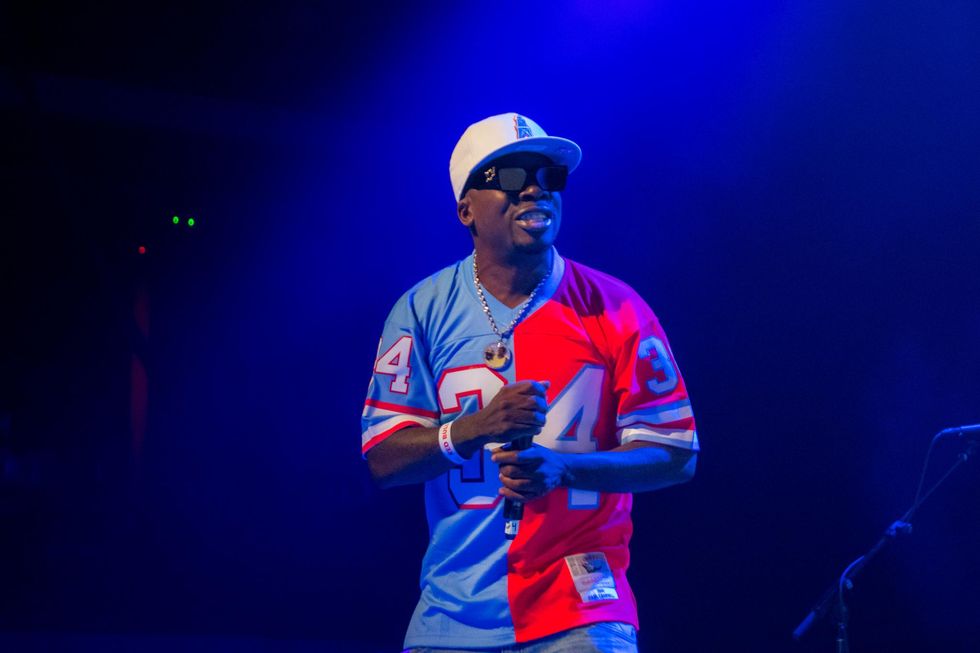
Lil Flip
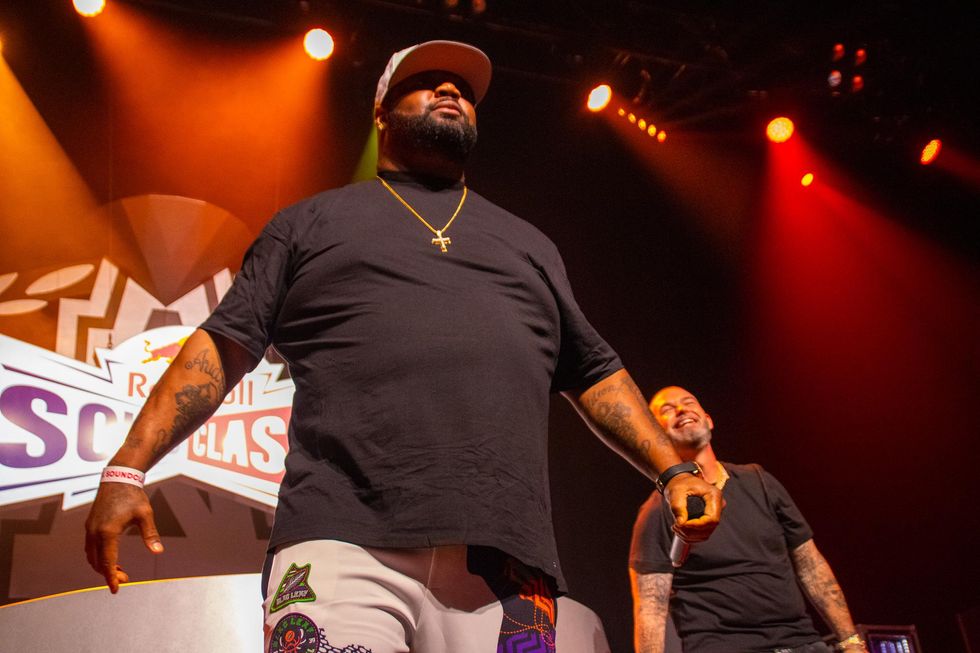
Big Pokey
You, Lil' Flip, Lil' Keke and basically all these guys you either listened to or came up with were so young when you started. What was that like being all middle and high schoolers getting into this?
Me and Lil' Flip the same age! He came on the scene earlier than me. There's Lil' Keke for sure, Fat Pat, Big Pokey. They're a little bit older than me, maybe like five or six years older than me. I'm in middle school, they're in high school or fresh out of high school rapping on the Screw tapes. That was something that, like I said, we took a lot of pride in because they're talking about Houston stuff, Houston landmarks, Houston icons, street legends, things like that. They got cars they talked about in a verse that you can actually go to the club that night and see because they're going to the club and you'll see them in the parking lot!
It was one of the things that I loved. Since sixth grade in Texas, you're taught Texas history. You're taught that not everything's perfect in Texas and you shouldn't sweep the bad things under the rug, but you're always taught Texas pride. It showed with the music. That was something that really spoke to my soul. But then, talking about Lil' Flip, we're out of high school and he was doing a record deal! We doing talent shows, you're doing record deals. That was another example of like, it can be done. We got to put in work.
What was it like to be able to grow alongside these people?
It's been amazing. Yeah, it's been truly amazing. Part of it is they're my musical heroes. But even if I wasn't a rapper or a musician, they are still my heroes with how they represent the things they do all you know. Lil' Keke always has been my favorite rapper of all time. He's always been, ever since the first time I heard him. That's my guy, right? The greatest to me. I would say about 85 to 90% of the Houston culture, whatever it is, is derived from Lil' Keke. He would articulate things so well on the Screw tapes and it would stick with me. It's one of the things that you can take pride in. Every time I'm ever on the mic, I gotta make them proud. I can't be up there half-stepping. I gotta come with it all the way. I gotta make my OGs proud.
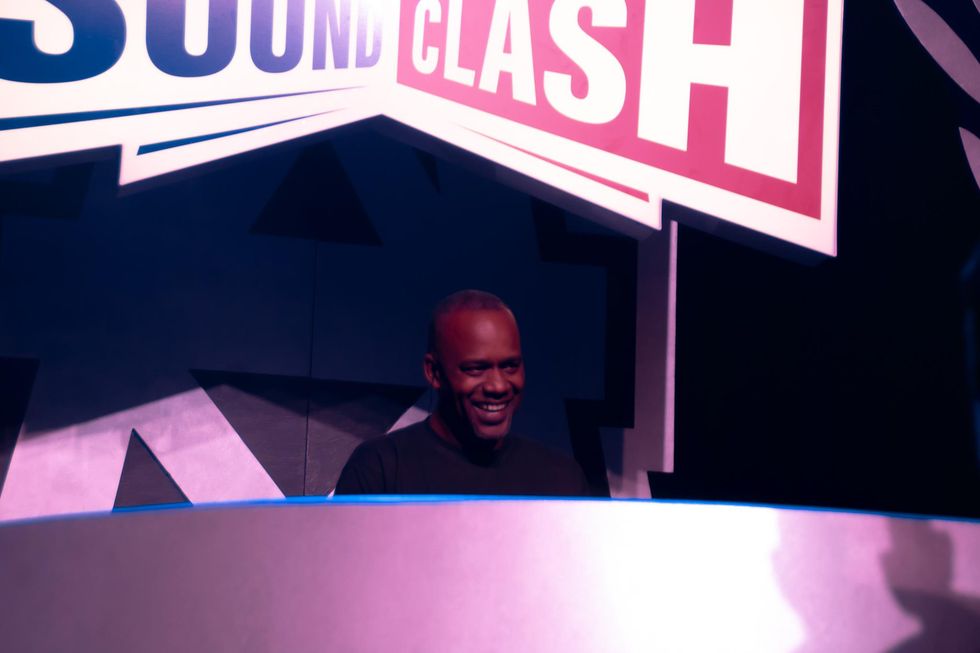
OG Ron C
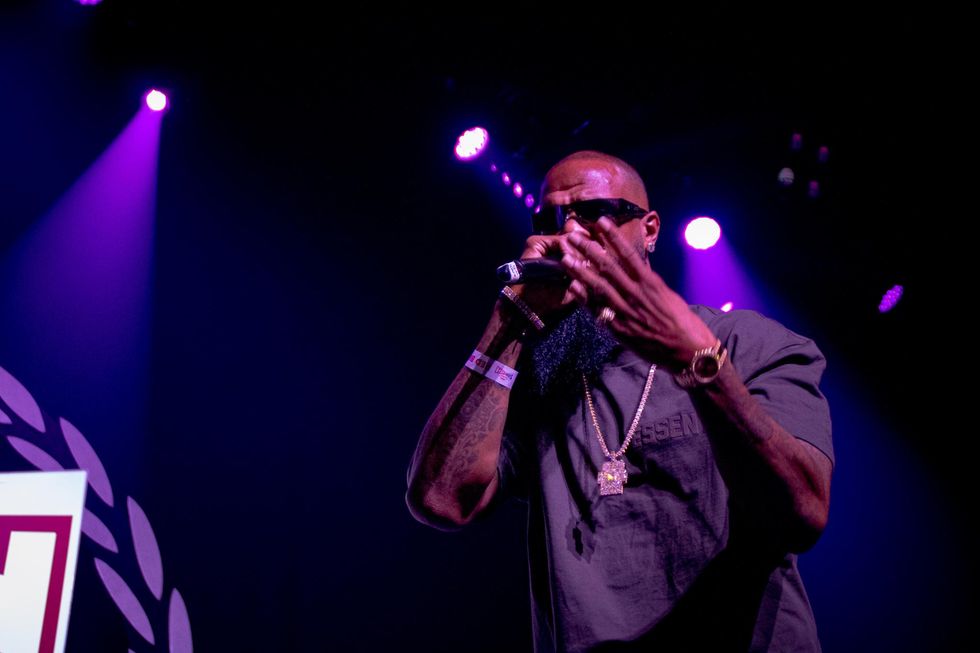
Slim Thug
So clubs down here have a very different meaning. It's a testing ground for all things hot. Those DJs and clubgoers are judge, jury and executioner. What was your first club performance like?
I remember we used to do talent shows all the time. Every now and then we'd do something like the community center. But the first time I performed at a club, it was a legendary club on the north side of Houston called Chocolate Town on 45 and Parker —
I like the sound of it already. Was it a strip club too?
First time I ever got lap dance was there! Sunday night, they'd have stripper night up there. We'd get there early. It wasn't a strip club, but they did bring the strippers out.
I remember being 14 and going up on stage. It was me, Chamillionaire and our other homeboy, PKT. We got booked to open up — well, we basically begged the promoter. He finally was like I'm gonna let you perform, and we might have had to pay him maybe, you know, $500?
I'm sure he had that deposit because it's a risk to have a 14-year-old perform at a big club.
Of course! It used to be them things where you go up and you're like, "Oh, I left my ID at home," but you pay $10 and they let you make it in. I remember performing and I had the last verse of the song, so it was all three of us on stage with all our homeboys. We had everybody there rocking. We opened up for Big Mike from the Geto Boys. I remember coming out on stage and as soon as I got on stage, I tripped over the monitor. It was so embarrassing — but I got back up and did my thing! That showed me right there that you're gonna fall and you're gonna make mistakes, but you always got to get back up.
From there, it was like, I can do this. I just got to improve. I gotta practice. I always remember that show. In Houston culture, when it comes to performing, we got a little man syndrome. We got a little man complex where if an artist comes here, we don't want to ride they nuts too hard. I don't want you thinking I'm on your nuts because you might not appreciate it and you might be like "Oh, you on my nuts!" So the flip of it is "Alright, well, I'm not gonna show you no love. I'm just gonna stand here and mean-mug!" But I grew up in this so I understand it. The same artists you mean-mug, if you get a chance to meet him, you go, "Hey, man, I love you! You rock the show! I love it!" I remember in the earlier days when we first would start going to the East Coast in New York or somewhere, a lot of our forefathers from Texas would warn us and say, "Man, when you go to New York, you better step your game up." Now you always want to do your best when you're on stage, but New York is the birthplace of hip-hop. This is the mecca of hip-hop. They'll boo yo' ass in a heartbeat. No matter who you are, what you got going on, if you ain't giving it your all on every single beat and on every single bar, then they're gonna let you know it.
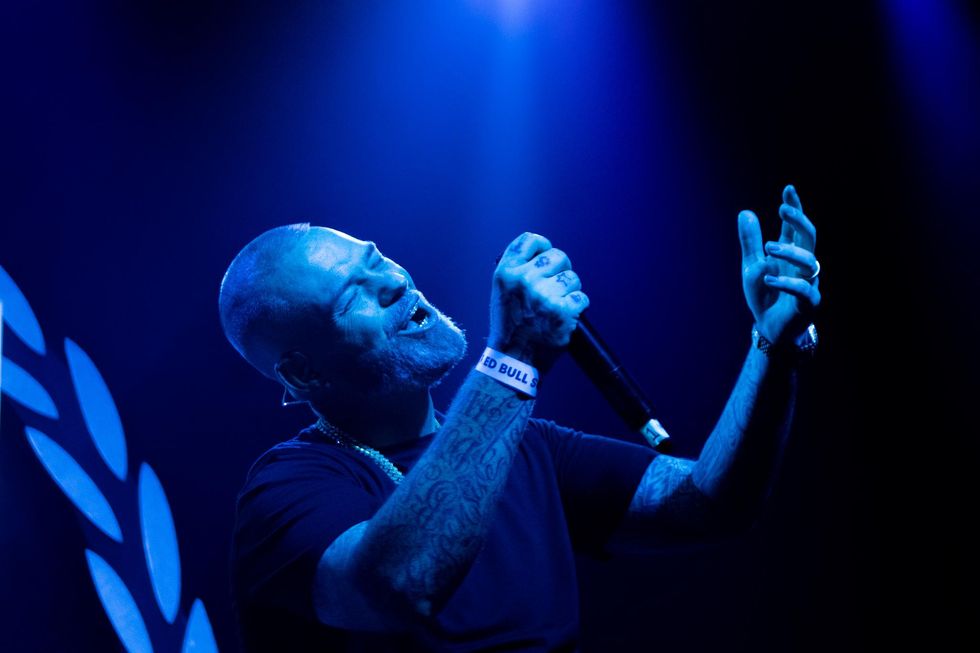
Was it tense your first time performing in New York?
Only because of that and just the magnitude of being in New York. It was one of the things where we didn't, at least in our minds, we didn't think we ever got love. If we come up there, nobody gonna show us no love. But they did. I've performed easily 50 times in New York and I've never once had any negative aspect, performance, anything where anybody mean mugged me, or booed me, or gave me the middle finger, or any of that. That's stuff that you might get if you go to Texas! Rest in peace to my boy Young Dolph. I was a huge Young Dolph fan, and as soon he started to kind of blow up, me and my boy were booking shows.
And so of course, when the rapping took off, I could stop booking shows and start booking for other artists. I stopped doing that because we're performing all the time. [Dolph] had been to Houston but he never performed here. This was like 2010, 2011. I remember telling him, "Man, I want to be the first person to ever bring you to a show in Houston just so I can say I'm the first person!" From the first time I heard Young Dolph, I knew he was the man and I knew he was gonna blow up. I can see it. He was so hard. So you know, even if I didn't do it, for sure he was gonna get booked. Before he passed away, he probably did 50 to 100 shows in Houston. I just wanted to be the first, not even on no discount or as a favor. My birthday is March 31 and they said, "What do you want to do for your birthday? Why don't we put on a concert? Who do you want to see?" I said my boy Young Dolph. So we brought him down and it was his first show in Houston. I remember telling him before he went on stage that they fuck with you, we fuck with you, but we're scared that people gon' clown us and shit on us. They're gonna be out there mean-mugging, but when you come on stage and they see you, they're gonna be trying to dap you up and take pictures with you. Don't get thrown off by everybody. Sometimes you just gotta go out there and earn your respect.
Speaking of Dolph, you two have the perfect voices for rap. Was your voice always this deep?
Nah, I was a little nasally at first. I remember in the early days, me and Chamillionaire were doing demos. I'm in the studio hearing it back afterward and saying, "Man, why they got me sounding like that?" I sound like I'm holding my nose together. I remember hearing Slim Thug have that deep voice and I wanted to sound like that! Why I sound like I'm holding my nose? I would try to put some more bass in my voice a little bit when I'm rapping on the mic because I don't want to be on there sounding like a weenie and definitely, I got it. Definitely smoking made my voice a little more raspy as well.
Going back to Gary, some of his work and the work you do, you are really big on community activism. Your mother was involved in the civil rights movement. Tell me about how important that is for you.
We're a community and you gotta give back. People lift you up and when you get up, it's your job to pull other people up. So it's not always monetary. The most effective way to give back is just giving your time, treating people how you want to be treated, the simple things. With my mom, that was something that was instilled in me from an early, early age. I remember being in kindergarten and people come into the schools and talk. My boy Mattress Mack, I remember being in kindergarten and he came to my school to talk about dangerous drugs. He was a celebrity! He was somebody you'd see on commercials on TV, every other commercial would be him. You'd see Bob Hope doing tours in Vietnam. Wouldn't it be cool if I get to do something like that? J. Prince will always do turkey drives for Thanksgiving, Christmas drives, and he'd call us like "Ay man, you better come up here and pass out some turkeys with us." My mother was a teacher. I remember Michael Watts and OG Ron C would come to the schools and do pizza parties. They'd say, "Hey, if you pass the state test coming up, then you'd get to come to the party and you get pizza." You get an opportunity to give back? We would always take it.
It goes in line with your title as The People's Champ.
It was the nickname my homeboy gave me. All of the Houston rappers got different personalities. We are a little similar in a lot of ways, but we different. Slim Thug is Tha Boss, Lil' Keke's Da Don and he's running shit. I'm The People's Champ! It was a nickname my homeboy from Dallas gave me. I really appreciate the fans. They cared about who I was and wanted to listen to my music. I remember being 12 years old and I met Bushwick Bill in the airport. He was just so cool. He was sleeping and I nudged him and he was like, "Man, where's your mother?" He just chopped it up for a little bit and I thought I better leave before security come, they might beat me up or something.
I remember meeting Questlove. I think he was on tour with Erykah Badu when she did that "Call Tyrone" before it came out. He's on the side just standing there and I was like, "Am I allowed to go talk to him?" You know, you don't know the protocol. I just walked up to him and he was super cool. He gave me the time of day. He cared, he asked questions and talked about a lot of different things. As I got older, I did street promotions for Def Jam. I was 17 and I did a shitload of promotion for this one artist on Def Jam. They came through for their album release party and I had been promoting the album and singles and album release party for a long time. So the artist came in. I'm thinking he knows that I'm the one who did all of that. He don't know! So I go to him and say what's up and he starts shitting on me! He didn't want to talk to me, wouldn't shake my hand. I feel I had entitlement because I was a fan and because I was putting in work.
I understand now that it don't necessarily work like that, but for me as an artist, I remember how he made me feel. I remember thinking, "Man, I never want to make nobody feel that way." I want to make people feel the same way Bushwick Bill made me feel and how Questlove made me feel. That's how I want to make you feel. Fans, to me, they have entitlement! You rocking with me? I'm on your time, because if I ain't got time for you, you're turning the station next time. You're not adding me to your Spotify. I wouldn't be nothing without the fans. The People's Champ is something to really try to live up to.
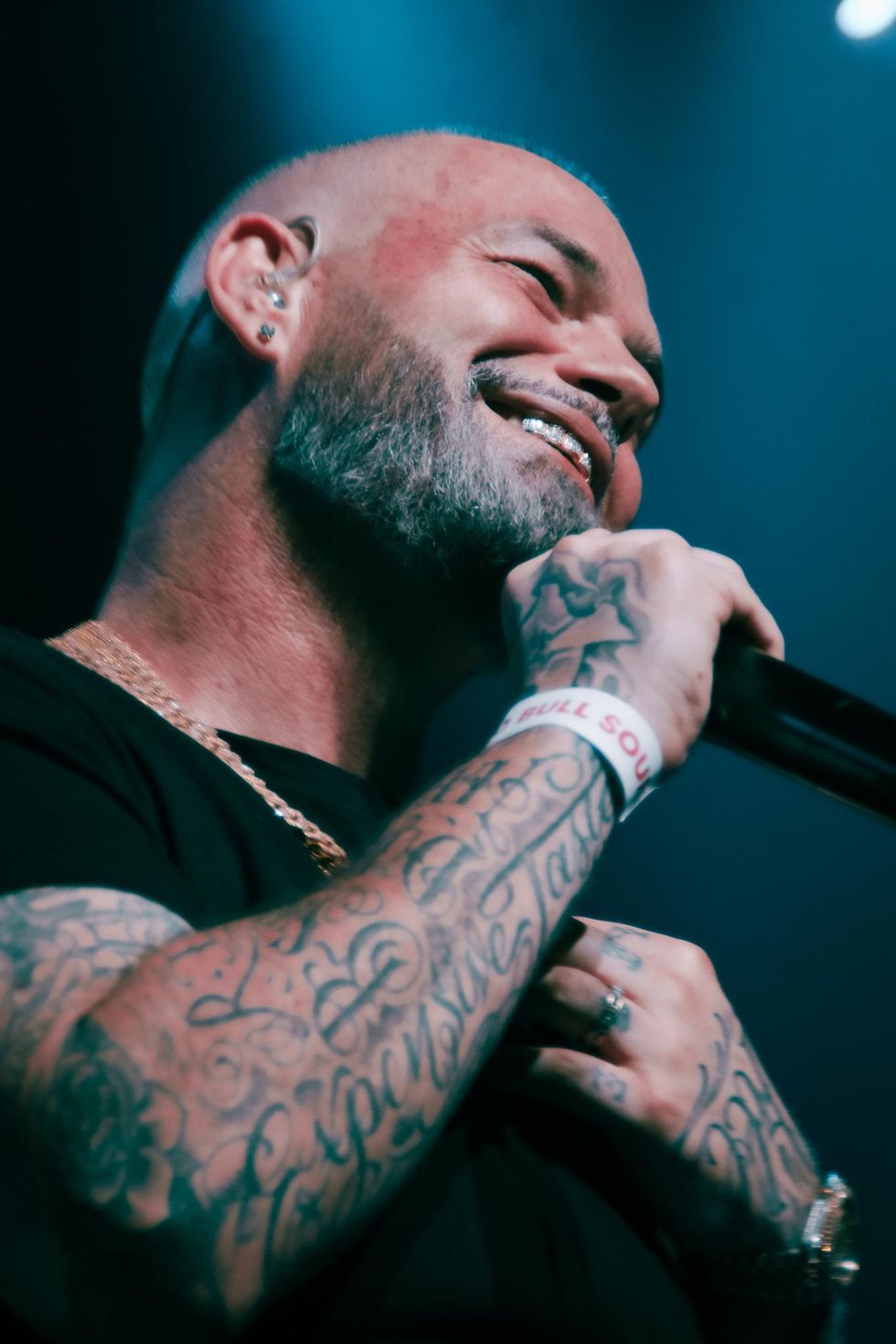
Photography courtesy of Jade Gomez
From Your Site Articles
- Houston Loves Megan Thee Stallion ›
- Gary Clark Jr. Is Your Favorite Rapper's Favorite Guitarist ›
- Larry June Brings the Bay to the SoundClash Stage ›
- Rico Nasty and Danny Brown Go Head-to-Head for Red Bull SoundClash ›
- Red Bull Announces 2022 SoundClash Lineup ›
Related Articles Around the Web